If days start to blur and your mind whispers, “I’m missing my life”, that does not mean you’re broken; actually, you’re just caught up in your runaway thoughts and time pressure. According to research, people who are always in a hurry or rush things usually perceive time as moving really quickly; it’s a phenomenon called “being rushed”. Further anxiety also speeds up this effect of how fast time is passing [1] [2].
These forward-moving sensations get stronger when your attention shifts away from the present moment. This is something minds are naturally wired to do, but according to research studies, it is also linked with feeling less happy [3]. If we understand it simply: stress + mind-wandering = life on fast-forward.
Next, the good and encouraging part is — you don’t need a ritual or a long meditation session. You just need a mindfulness training based on ACT (Acceptance & Commitment Therapy). That’s a practical move that helps loosen the grip of that sentence, “I’m missing my life”, so you can return to the present moment.
Why time feels like it’s speeding up (science in 90 seconds)
Psychologists frequently point out that experiencing a sense of urgency differs from merely having a lack of time. It’s a distinct feeling characterized by a perceived hastening where the day appears to speed by. Studies have indicated that anxiety can speed up our internal perception of time, causing it to feel as if it’s passing more quickly even in the absence of a specific fear. This phenomenon intensifies when the mind starts to drift.
Daily life studies show that whenever the mind wanders, people report feeling less happy, no matter what they’re doing. [3] The opposite is also true: moments that feel fresh, uncluttered, or especially memorable are judged as lasting longer when we look back on them. Put simply, the way we pay attention—and what we remember can stretch or shrink our sense of time. [ Download: Nature Human Behaviour – 2024 ]
One ACT move (no mantras, no timers): Name-the-Story Card
This exercise is a defusion technique, an ACT skill that allows you to see thoughts as stories rather than commands. Instead of the usual “I’m having the thought…” phrasing, you’ll give the entire narrative a title and then “park” it for a moment.
How to do it (about 60–90 seconds):
- Title the story.
The first thing you can do is write something like: “The Missing-My-Life Story” on a sticky note or in your Notes app. - Hold up the title (physically or on screen).
Silently say to yourself: “Title card up.” This indicates that a story has begun, nothing more. - Write today’s line under the title.
For example: “I blinked and this week vanished.” just make it short and concise, only one sentence. - Set the card aside (or minimize the note).
Keep the title visible somewhere in a small area. That would serve as a parking zone. You’ve acknowledged the story without diving into details. - Step back into the present with one micro-action (≤2 minutes).
Pick one small, concrete step that reconnects you with your values. For example: stretch, send a short message, tidy a space, or step outside.
Memorability micro-shot: Capture a single image of a particular detail in your surroundings, such as how the light reflects off a mug or the shadow that stretches across the floor.
One-line log: Capture the moment in a 10-word note: “Sunlight streaming onto the desk, email sent, tension easing slightly.”
Values nudge: Do one tiny action that reflects who you want to be, send a kind check-in, rename a file clearly, or step onto the balcony for 30 seconds and really look.
Why it works: Defusion shifts the context of the thought, not its content. By giving the narrative a title, you’re naming the process (“this is a story”) instead of obeying its commands. From there, you can let behavior flow from values and sensory contact, not from the story’s orders. Research has shown that defusion reduces the believability and sting of sticky thoughts, and ACT trainers often teach “notice and name” for exactly this reason. [ Behaviour Research and Therapy** (2004). PDF ]
Tip: Stick with the same title for a week. Each time the script shows up, lift the same card. The repetition helps your mind to recognize, “Oh – it’s that story again,” and let it pass more quickly.
Three moments to try it today
1) Commute blur
Title card up → Missing-My-Life Story.
One-line log: “Gold light through bus window; teenager laughing two seats ahead.”
(Instead of letting the ride vanish into autopilot, you’ve turned a fleeting second into a memorable micro-moment. Research shows that these kinds of vivid, specific snapshots stand out in memory and make time feel fuller.)
2) Calendar crush
Title card up → Missing-My-Life Story.
Values nudge: rename your deck “Q3-demo-v3-FINAL-DATE” and paste in the opening line.
(When deadlines pile up, it’s easy to spiral into “I’m drowning” thoughts. A tiny, values-aligned action, like organizing your file, shifts you from time panic to traction. You’re no longer at the mercy of the story; you’re back in charge of a useful move.)
3) Sunday whirl
Title card up → Missing-My-Life Story.
Memorability micro-shot: the sauce bubbling, a child’s sock half-on, the crack in your favorite plate.
(Ordinary moments often blur together, but catching one small and specific detail slows things down. These sensory anchors help stretch the felt passage of time, turning the everyday whirl into something that sticks in memory.)
Common questions:
Isn’t mindfulness about a quiet mind?
Not really. In this context, mindfulness just means flexible attention. You don’t need silence or stillness; you can practice it mid-email by labeling the story in your head and then taking one small, value-aligned action. Defusion, which is a mindfulness skill from ACT, isn’t about silencing thoughts but about loosening their grip so they no longer dictate your behavior.
How is this different from “positive thinking”?
Defusion is about changing the frame around the thought, where you see it as just a story rather than a command. It isn’t about swapping a “bad” thought for a “good” one. According to research, defusion lowers how much people believe and get hooked by sticky thoughts, without needing to debate or replace their content.
Can I slow time on purpose?
Not really, but you can change how time feels. Anxiety often compresses your sense of time, while novelty and memorable details can expand it. The title-card method helps you step back, park the story, and then create a small moment that is memorable or meaningful. Over time, those micro-moments add up to a richer sense of presence.
Try it now in MetaMindful.
Open Defusion Session → Name-the-Story Card. In just three minutes, you will:
- Give your narrative a title (e.g., “Missing-My-Life Story”),
- Park it with a simple, visible “card,”
- Take one small action that makes this moment matter.
Time itself won’t slow down but with a title card and a tiny, values-aligned move, you stop slipping past the present and start inhabiting it.


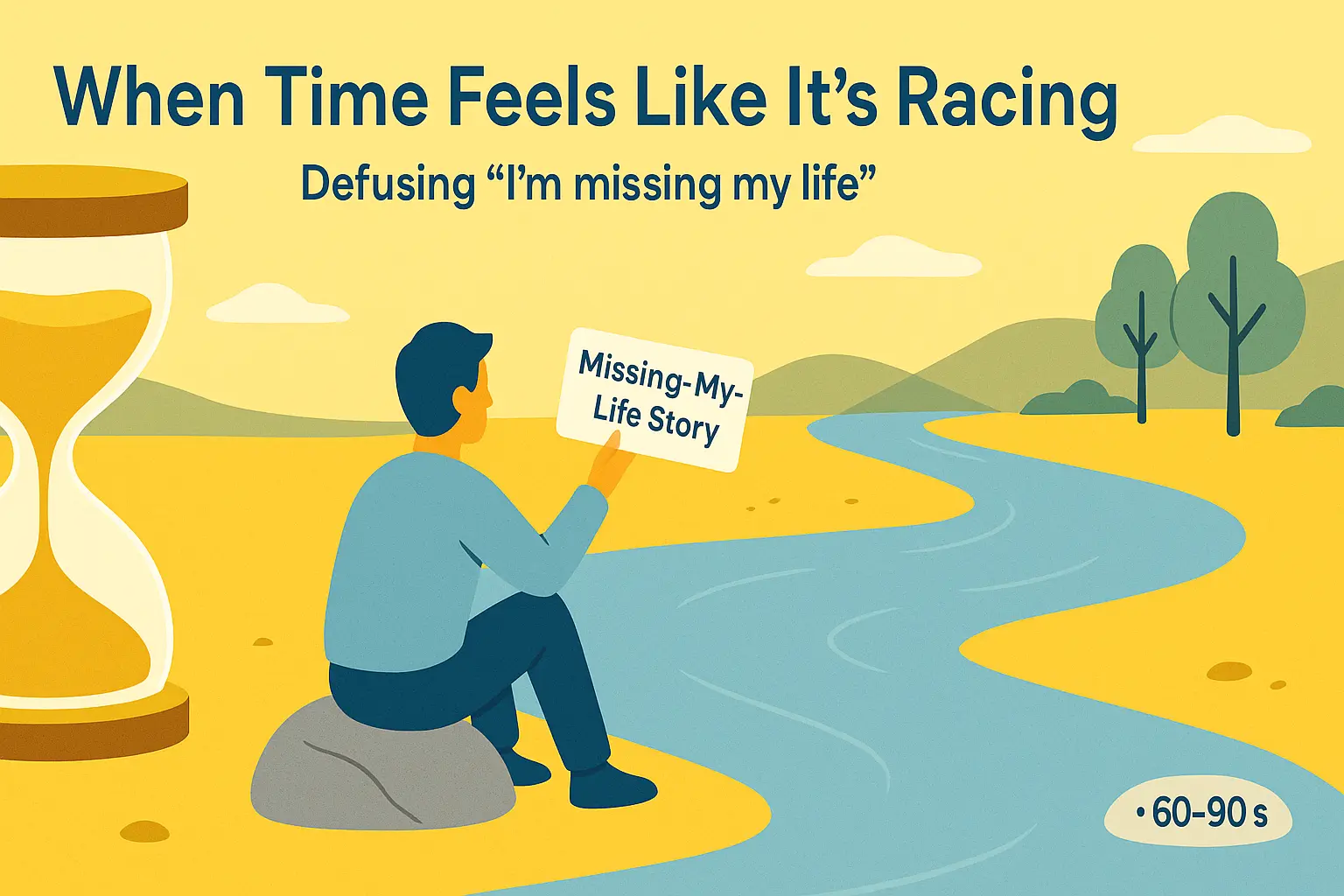
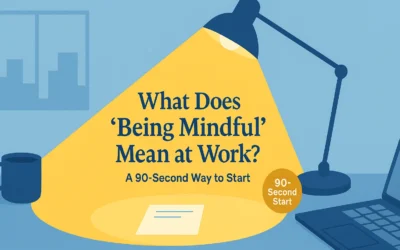
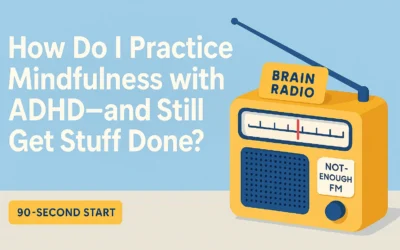
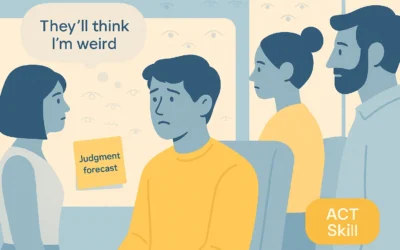
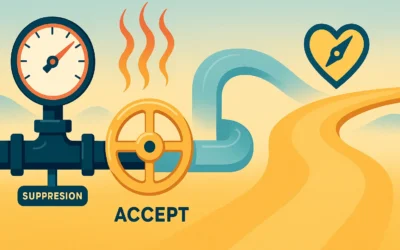
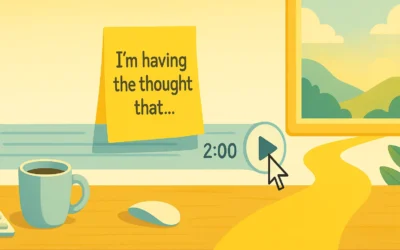
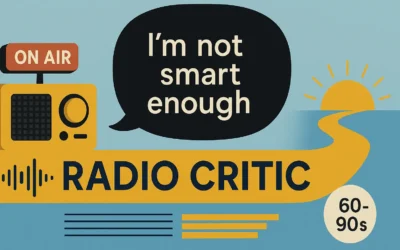
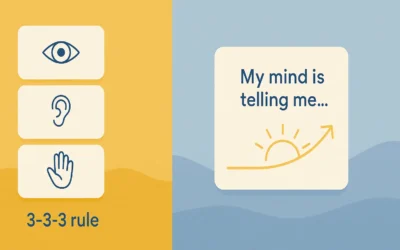
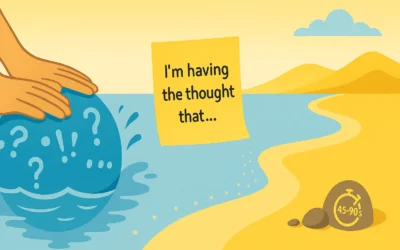
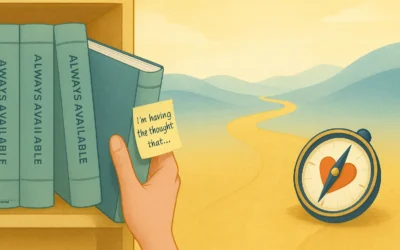
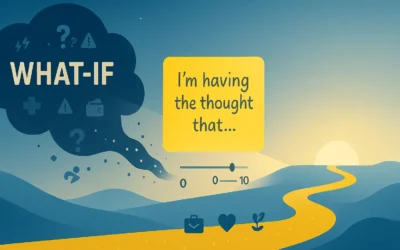
0 Comments